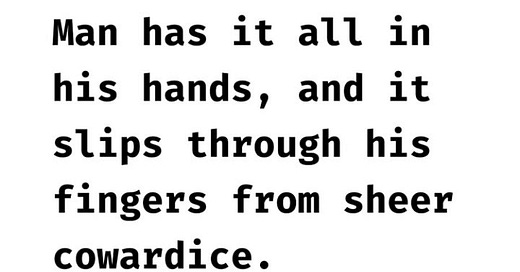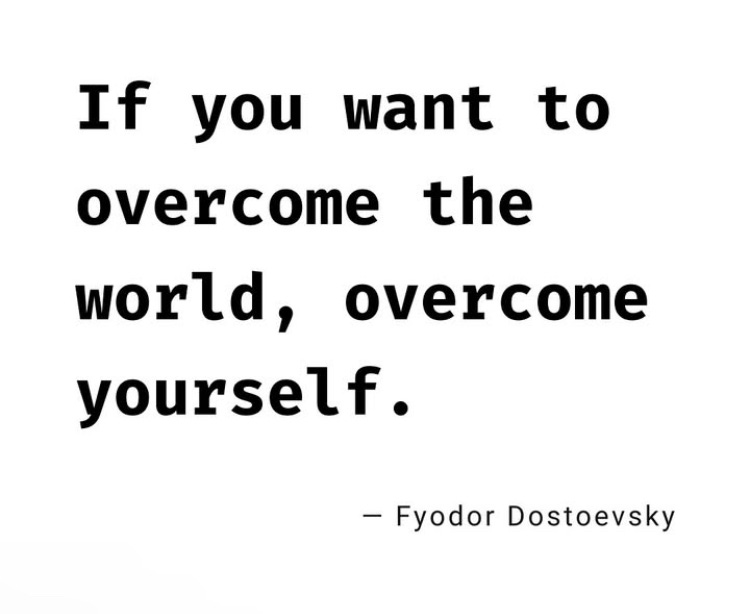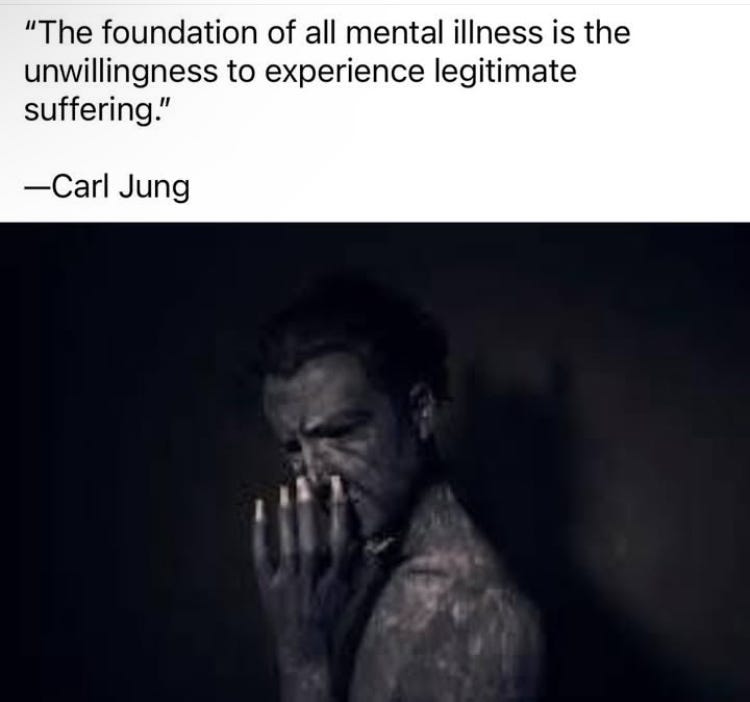We’ve created a system in which personal responsibility and the potential for growth have been conceptually erased, in order to comfort people who are struggling or failing or weak or dependent. Personal responsibility is simply too difficult, according to our elites, and so many people should be relieved of it-even if this means their lives remain terrible. It’s not an accident that this attitude allows a maximal expansion of the bureaucracy. Millions of people now live lives completely dependent upon the care of government agencies and professionals, rather than friends and family and themselves. This is a unique social condition in human history and we’re everywhere urged not to notice it. Ignoring its strangeness and its pathological results is considered ‘compassion.’ It is not compassion. At best it’s condescension and at worst it’s something else.
:Camus was not a true believer. He cherished freedom too much—and, as Hoffer writes, “Freedom aggravates at least as much as it alleviates frustration. Freedom of choice places the whole blame of failure on the shoulders of the individual.” The true believer flinches from freedom because “Unless a man has the talents to make something of himself, freedom is an irksome burden. Of what avail is freedom to choose if the self be ineffectual?” Art with an agenda is the antithesis of artistic freedom but it is an attractive prospect for some—because making propaganda provides an easy lift for the failed artist.
In People Suck, I explored a recurring idea: people are mostly mediocre and disappointing creatures. This wasn’t just a misanthropic rant. I believe that recognizing our frailty and fallibility is a necessary component of accepting personal responsibility, and accepting personal responsibility is important. It’s important for our own lives, but it’s equally important for policymaking. Everyone has the ability to change their situation, and if we pretend that’s not true, or that it’s somehow mean to ask for improvement or recognize that agency exists for everyone, we will be erasing the most important aspect of human social psychology.
We all recognize on some level that people suck. The idea that structural factors are weightier causes on outcomes than personal beliefs and behaviors is simply not true. Poor people are poor mostly because of how they act (how they work and spend). Prisoners are mostly in jail because of the decisions they make. Fat people are mostly fat because of their habits. This isn’t a harsh claim-it’s actually liberatory. The important thing to note is that it’s true, though, and pretending that it’s not (in order to shield people from ‘blame’ or ‘stigma’) does no good to anyone.
Go to a medical conference, or teacher’s training, or the CDC website, or a therapy workshop. You will probably encounter a relentless, saccharine, feminized message of niceness and sympathy. There are two major issues with contemporary policymaking:
Real causes and needs are ignored, and minimized in favor of things that the bureaucracy can address (and generate activity and resources for itself in addressing).
People have diabetes and they need to get active and stop consuming sugar. Where are the mechanisms to push people toward those goals? They don’t exist. Instead we wax poetic about ‘food deserts’. Food deserts are a beloved confabulation of sociologists and activists, but something that barely exist in the United States. How many people living in ‘food deserts’ use Door Dash? How many black single mothers buy chips and soda in ‘food deserts’, while their Hispanic neighbors buy meats and vegetables and beans, and cook balanced meals? You can go to a dollar store and find healthy options: packets of chicken, cans of beans, plastic tubs of fruit. I’ve been doing it for years.
The bottom line is that activity and decent eating is a minimal requirement which virtually anyone in our country can satisfy. If people are not satisfying it that is because they don’t want to. I refuse to believe that education is a major variable, although perhaps it is. If it is then it is easily corrected: you need to exercise lightly for an hour per day and stop consuming sugary snacks and sodas. There-you’re educated. That fact-that people are choosing not to improve themselves-should be recognized, and not silenced or swept under the rug for researchers and policymakers and providers. Igniting that desire to change is practically the only thing many of these professionals can helpfully accomplish, and it’s the one thing they refuse to consider.
Kids are behaving terribly in school and then getting into delinquency and crime because they have grown up in fatherless, dysfunctional families. Where are the mechanisms to address that? They don’t exist. Instead, we have a massive complex of school counselors and ‘resource officers’ and-later-judges and wardens and social workers, who stay busy addressing the damage and problems caused by these impulsive boys. Behavior plans and parent-teacher conferences and equity statements and therapy-all great for the bureaucracy. All completely impotent when it comes to addressing the real problem.
People are spending too much money on nonsense and aren’t saving because they’re undisciplined and reliant upon social safety nets and transfers and crime, because they never learned the self-control or long-term planning required to improve their financial situation. They’ll never be able to start businesses, and they will always rely on the government to pay for college and food and housing. Always-for generations. Where are the mechanisms to address that? They don’t exist. Asking poor people to budget, and to stop buying cars and phones and televisions is almost completely unheard of among public policymakers and politicians. Instead, we have a massive complex of social welfare agencies and professionals, busily managing the finances of 20% of our society. No one ever asks why that bottom quintile often seems to be stuck there, or how they could rise. What’s needed is more money and more programs and more professionals, apparently.
Personal agency is erased and forgotten. People sometimes need help. I’ve been on food stamps and I used government aid to go to college. It’s not that people are taking advantage of aid that’s offered-it’s that the system and philosophy of the aid is fundamentally flawed. People DO need help sometimes, but that help should be nested within a system which demands that people manage their own money and use the public’s sparingly. The system doesn’t account for personal agency or responsibility. It treats people who are driving last year’s SUV’s and carrying $1400 phones as if they’re Dickensian paupers. This is often a marvel and a source of consternation-and a source of hostility-for immigrants. People who are in the wealthiest 10% of the world’s population and whose main deficiency is the lack of wherewithal to not spend money on lottery tickets and cigarettes and clothes are being treated as if they’re some kind of unavoidable symptom of social inequality. Talk to the social workers and sociologists and activists, and you’ll hear it for yourself. “Asking poor people to spend less money on alcohol and shoes is wrong, paternalistic. They deserve their baubles and their sedatives. They can’t help it!” In my opinion, ‘they can’t help it’ is the most paternalistic and condescending attitude imaginable. Of course they can help it. Recognizing that people have agency is respectful, but it entails the recognition of some responsibility for both success and failure. Policymakers want a system in which there is no chance of success (you’ll always have the government, after all) and no blame or pain in failure. That is a fundamentally dehumanizing approach. It is treating adult citizens as if they lack the understanding and personal investment that these professionals attribute to their own children, then calling that monstrous infantilization ‘compassion.’
Mothers can better choose who to have sex with and fathers can better choose to spend time with their kids. It’s telling that the child support system has grown truly baroque and brutal, while abetting an attitude of parasitic dependence among many lazy women and an attitude of grievance (sometimes warranted) among millions of men (not all of whom are fathers). The system has grown without addressing the real issue whatsoever, which is the fragmentation of families and the absence of male role models. You might come to find that these bureaucratic systems are rarely interested in addressing root causes, or in solving social problems. They’re established with good intent (in some cases), and then the administrative organisms assume a life of their own. Solving the problems would only hurt the prospects of the bureaucratic organisms, and so they don’t bother. They pretend to be addressing problems, while they apply band aids and clean up messes. There’s an enormous amount of money in that.
People can live more active lives, and they can stick to strict diets. If they don’t, then perhaps they shouldn’t be absorbing tens of thousands of dollars of public resources in order to help control the blood sugar that they refuse to take responsibility for, and in order to address the organ damage and comorbidities that inevitably result.
It is one of the wonders of the modern world to me that controlling one’s own diet is regarded as simply too difficult. It’s too much to ask. There’s even a flourishing cottage industry on social media (nearly all geared towards women) of people who diligently work to reassure people that one can be ‘healthy at any size’ (HAES) and that ‘body positivity’ is important, and that the discomforts and insecurities that fat people experience are a social issue. Fatness is fine and you shouldn’t feel bad about it. That’s the message. We’re building a world in which a person can find reassurance and support and validation and help everywhere they turn-and yet these problems just keep getting worse. Now, of course, we have Ozempic and similar drugs, which basically just suppress the appetite. People are paying +$500 a month to avoid slight feelings of hunger and food cravings. Almost no one has noted this absurdity. Why? Because it’s so common. Women (and men… but mostly women) want to be thinner, and they also don’t want to contend with their appetite, and so they medicate themselves to avoid discomfort. It’s the mantra of our civilization.
I haven’t even spoken here about psychopharmacology or therapy or pedagogical theory or adolescents and smart phones or gender dysphoria or eating disorders or ADHD or parenting or a hundred other topics. Believe me: this kind of thinking is dominant in every one of these areas.
Don’t mistake my claims-it would be difficult, under our system, to establish institutions to force people to exercise or to marry their children’s fathers (or maybe not have sex with those men in the first place-this kind of possibility is almost unspeakable in mainstream society these days) or to force poor people to stop buying hats and electronics. In certain cases, bureaucracies could establish rewards and penalties and restrictions. For instance, if you’re on food stamps those monies should only be spent on nutritious foods, or you can only use rental assistance for one year out of 5, or you must lose weight (if obese) in order to receive public health resources. The fact that these kinds of ideas are, in certain cases, almost unbelievably radical probably says a lot about our culture.
However, that’s not my intended message here. I don’t think paternalism is the answer and the effects would probably be marginal. What we should instead recognize is that human nature is such that if you give poor or impulsive or fat or addicted or antisocial people unlimited help without any sense of personal ownership or desire to change on their part, you’re simply making their vices easier and more comfortable.
The first and most important ingredient in addressing social problems is a sense of personal responsibility and investment on the part of the people affected. If that element is present, incredible things can be done with very little. Without it, billions will be spent and decades will pass without any appreciable effect, other than gradual increases in social pathology. People aren’t supposed to lead easy and comfortable lives. They’re supposed to live prosocial and challenging ones. That’s not too much to demand, of anyone.
We probably reached a point, long ago, at which all of the programs and medications and support resources and professionals weren’t really chipping away at the real suffering and trouble of the world. They were merely making it easier to be weak, and by suppressing any discussion or estimation of personal responsibility the effect was a maximal increase in weakness and indulgence, and an atrophying of people’s considerable capacity for personal growth and resilience. Where will that end?
I will write more about this subject later. There is a lot more to say: veteran’s programs and mental healthcare, parenting, sexual assault allegations, safetyism among children, equity, caring for the homeless and for addicts and the mentally ill… these ideas are everywhere. They’ve thoroughly infected our society. For now, it’s enough simply to notice them, and to embrace personal agency in our own lives. The belief that you, and people like you-educated, well-raised, professional, whatever-are capable of doing things and fulfilling responsibilities that others are simply incapable of (and that it’s ridiculous and cruel to even ask) is the height of condescension. Ultimately, it’s an attitude of contempt. Humans have amazing potential. Our goal as a society should be to unlock that potential and not medicate and distract ourselves into decadence.










Truer words were never spoke, right up until the very last bit. I reckon that Jung quote at the end of the piece is bogus.
I'm an ex infantryman. I volunteered to suffer, and perhaps die for my country. I could mention other things about my life, but in the main I know a lot about personal sacrifice and suffering.
Anyway I made the mistake of marrying a woman who turned out to be a narcissistic sociopath. She employed all the usual tricks of such people...love bombing, gaslighting, emotional and physical abuse etc...and drove me to the point where I was thinking that suicide was the only way out. Soooo..I was mentally ill, but was it because of a lack of ability to suffer? No, it was because I was being abused by a deranged maniac who took total advantage of her status as my wife to drive me nuts.
I escaped all that shit, kept my sanity, stayed in touch with my kids and now lead a good life with a good woman.
Like I said, fine writing mate, but I cannot, in any way, concur with Jung's thoughts on the matter.